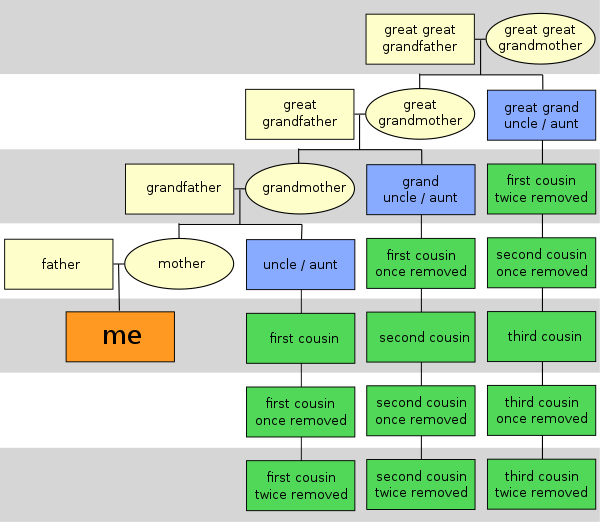Cousin
descendant of an ancestor's sibling
A cousin is a term in genealogy. A cousin is not a direct ancestor or descendant, but is a relative who shares a common ancestor. The word 'cousin' is often used to mean a person's first cousin – the child of someone's aunt or uncle.

Cousin relationships can have degree and removal (e.g. a second cousin once removed is a cousin with a degree of two and a removal of one).
- The family line of the cousin with smallest number of generations to the most recent common ancestor is used to determine the degree (if they are the same use either one). The number of generations from the parents to the common ancestor (number of generations minus one) is the degree.
- When the cousins are separated by a different number of generations from the most recent common ancestor, the cousin relationship is "removed". The difference between the number of generations for each cousin is the removal.
| If the relative's → | Grandparent (2) | Great-grandparent (3) | Great-great-grandparent (4) | R generations to common ancestor | |
| Is the subject's ↓ | Then the relative is the subject's ↘ | ||||
| Grandparent (2) | 1st cousin | 1st cousin once removed | 1st cousin twice removed | 1st cousin |R-2| times removed | |
| Great-grandparent (3) | 1st cousin once removed | 2nd cousin | 2nd cousin once removed | 2nd cousin |R-3| times removed | |
| Great-great-grandparent (4) | 1st cousin twice removed | 2nd cousin once removed | 3rd cousin | 3rd cousin |R-4| times removed | |
| S generations to common ancestor | 1st cousin |S-2| times removed | 2nd cousin |S-3| times removed | 3rd cousin |S-4| times removed | (min{R,S} - 1) th cousin |R-S| times removed | |
Related pages
Other websites
🔥 Top keywords: Main PageSpecial:SearchSupreme Court of the United StatesList of UEFA European Championship finalsWikipedia:AboutList of U.S. statesHelp:ContentsHelp:IntroductionKnights of the Round TableList of Disney moviesBlackSpecial:RecentChangesGodzilla X Kong: The New EmpireList of people who have walked on the MoonList of U.S. states and territories by time zoneUnited StatesThe Garfield MovieEducation24-hour clockEid al-AdhaGolden EdgeQueen (band)List of countries by continentsAviciiBig Mac IndexAdolf Hitler UunonaUmro Ayyar - A New BeginningMurder of Junko FurutaHelp:Authority controlCristiano RonaldoBismillahir Rahmanir Raheem19 Kids and CountingSOLID (object-oriented design)Jude BellinghamXXXTentacionLisa SparxxxPeriodic tableList of fruitsBTS